Lilly: 2017 Tax Reform Makes Four New U.S. Manufacturing Sites Possible
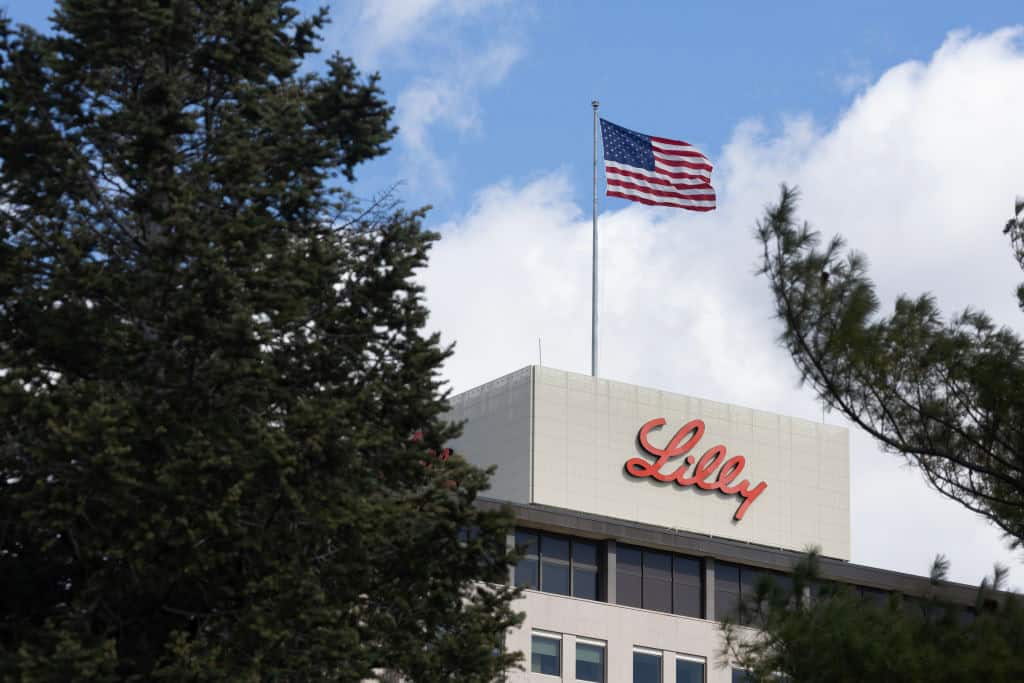
Biopharmaceutical company Lilly will build four new manufacturing sites across the U.S., it announced Wednesday at a Washington, D.C., press conference. The event was attended by NAM President and CEO Jay Timmons, Commerce Secretary Howard Lutnick, National Economic Council Director Kevin Hassett, Indiana Sen. Todd Young and Lilly Executive Vice President and President of Manufacturing Operations (and NAM board member) Edgardo Hernandez, among others.
What’s going on: Three of the planned manufacturing campuses will focus on producing active pharmaceutical ingredients, reshoring “critical capabilities of small molecule synthesis and further strengthening Lilly’s supply chain,” the company said in a press release. The fourth site will “extend [Lilly’s] global parenteral manufacturing network for future injectable therapies.”
- The investment in the four sites will bring Lilly’s total U.S. capital expansion commitment to more than $50 billion since 2020.
- Lilly—which in recent years has made $23 billion worth of investments in new research and manufacturing sites in the American South and Midwest—is in talks with several states about building the facilities there, but it is accepting additional expressions of interest from states until March 12.
The anticipated benefit: The four sites are expected to create more than 3,000 permanent skilled jobs and more than 10,000 construction jobs during building, according to the company.
The tax reform factor: Lilly’s planned expansion reflects “decades of research and dedication,” Timmons said at the event announcing the investment. It “is the culmination of sustained planning made possible by the certainty created through smart public policy—particularly the 2017 tax reforms that President Trump … championed back at a meeting of the NAM Board of Directors in September 2017.”
- Many of those manufacturing-critical reforms have been allowed to expire, however, and others will expire at the end of the year—unless Congress acts, and soon, Lilly Chair and CEO David Ricks said.
- “The Tax Cuts and Jobs Act legislation passed in 2017 during President Trump’s first term in office has been foundational to Lilly’s domestic manufacturing investments, and it is essential that these policies are extended this year.”
Keep the momentum going: Lilly’s announcement shows other manufacturers “exactly why [they] have reason for optimism and confidence,” Timmons went on. “But to keep this momentum going—to encourage more groundbreaking investments, more job creation and more life-changing innovation—a comprehensive manufacturing strategy must become the reality … because when manufacturing wins, America wins.”
Tax Reform Keeps Humtown Humming
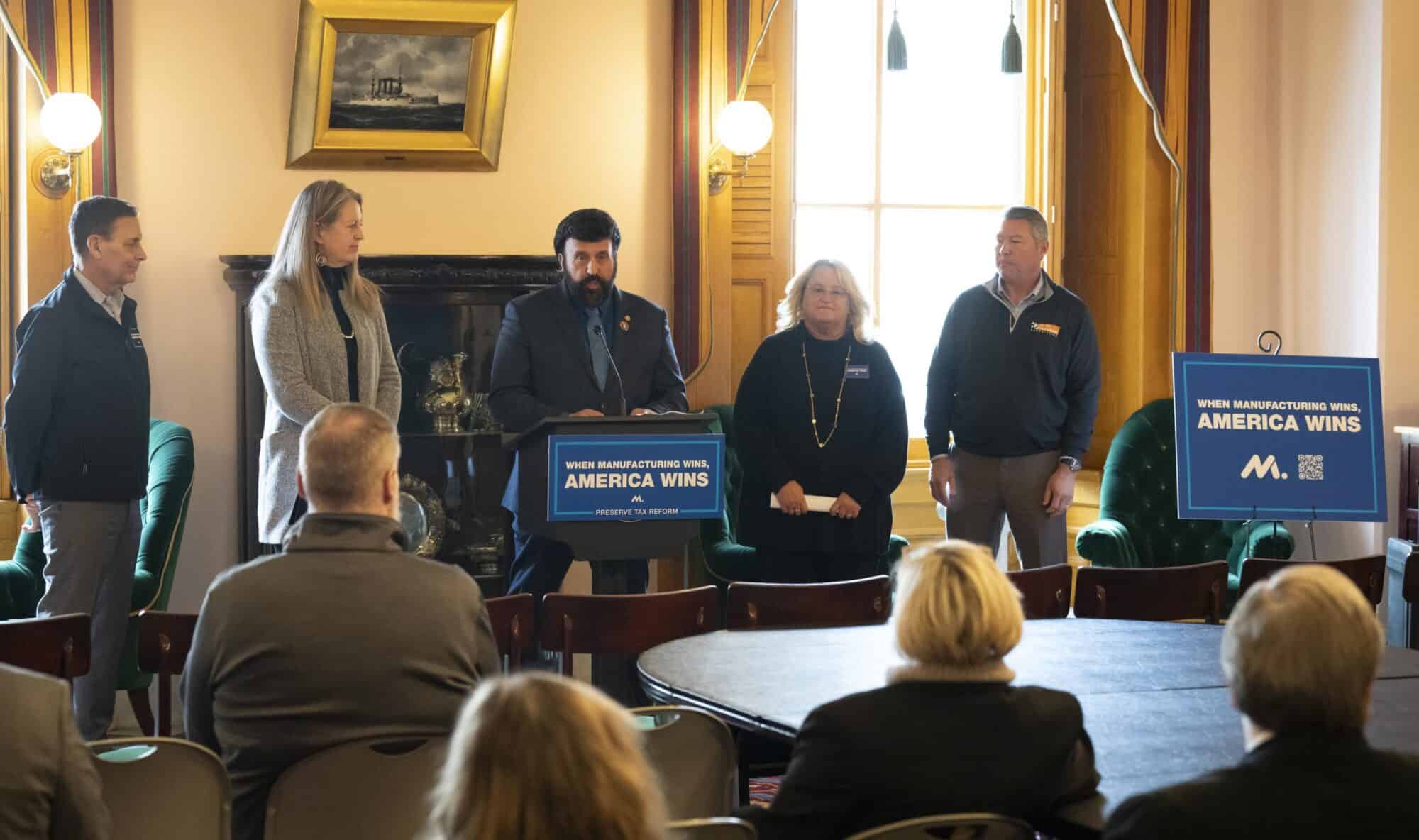
“Humtown is more than just a business. It’s a legacy,” says CEO Mark Lamoncha. The 60-year-old Columbiana, Ohio–based metal casting company has had three generations of Lamoncha leaders, starting with Mark’s father, Russell, who founded it as a small pattern shop in 1959. Today, Humtown is able to keep that legacy alive—and growing—in large part due to tax policies that support innovation, investment and job creation.
The benefits: When tax reform introduced full expensing for capital expenditures and research and development in 2017, Humtown reinvested its tax savings in expanding its operations, hiring more workers and purchasing more equipment, Lamoncha told attendees at an event at the Ohio Statehouse, part of the NAM’s 2025 Competing to Win Tour.
- “Since the 2017 tax reform, Humtown has invested over $9 million in capital expenditures related to 3D printing and averages around $100,000 annually in R&D costs,” said Lamoncha, noting that a single 3D printer can cost upward of $1 million.
- “Under the 2017 tax reform, we were able to deduct 100% of those costs, generating around $1.6 million in accelerated tax savings. That amount alone allowed us to purchase another 3D printer,” he added.
- These investments represent a huge benefit not only to Humtown, but to the larger supply chain it serves. Thanks to 3D-printing toolingless technology, Humtown recently fulfilled an urgent order of essential parts from an EV manufacturer, which traditional tooling would not have produced in time. The result: “Their new product launched 22 weeks ahead of schedule—proving that smart tax investments drive real-world innovation and success,” said Lamoncha.
The threat: As these and other tax provisions get phased out, Humtown is facing a painful increase in costs. Already, it is paying an additional $365,000 in taxes, which is “cutting back on our ability to reinvest in our team, new equipment and our growth plans,” said Lamoncha.
- But the cost for the manufacturing economy is much greater, he pointed out. “Every day Washington delays a tax deal, businesses are forced to second-guess investments, hold back on hiring and rethink expansion plans. For a small or medium-sized manufacturer, that’s the difference between adding a new production line or standing still—and, for some, staying in business.”
The wider community: The threat to tax reform will not only harm Humtown, but prevent it from investing further in partnerships that benefit its entire community.
- Humtown partners with Youngstown State University to educate students in grades 4–12 about 3D printing. The company houses a 3D sand printer purchased through the Ohio Third Frontier Grant program that is used mainly for educational programming.
- In this “hands-on, peer-led learning experience,” students are taught both digital file creation and manufacturing processes, and then lead their peers through the factory as “career ambassadors,” Lamoncha explained. (Watch one 9th grade group’s experience here.)
- Initiatives like these prepare young people for stimulating, high-paying careers in manufacturing, while ensuring manufacturers have enough young workers to keep growing in the decades to come.
The bottom line: “[V]isionary leaders like Jay Timmons and the NAM team are fighting to restore U.S. manufacturing—moving us from just 10% of GDP back to 25% or more. But let me be clear: this won’t happen unless we align state and federal policies to make America the best place in the world to build, create and manufacture,” said Lamoncha.
- “We have the talent. We have the technology. And we have the opportunity. Now, we need the commitment.”
Manufacturers: The Time Is Now to Finish the Job and Preserve President Trump’s 2017 Tax Reforms
Washington, D.C. – NAM President and CEO Jay Timmons released the following statement on the passage of the House budget resolution:
“Today, the House has taken a historic, pivotal step to advance a comprehensive reconciliation package that will preserve President Trump’s job-creating tax reforms of 2017, while also unleashing American energy dominance.
“Manufacturers urge Congress to move with a sense of urgency. Every day we wait means jobs and opportunity lost. As part of the comprehensive, commonsense manufacturing strategy that America needs, protecting tax reform will strengthen our industry and our communities. It’s time to continue this momentum and act now to Make America Great for Manufacturing Again. When manufacturing wins, America wins.”
-NAM-
The National Association of Manufacturers is the largest manufacturing association in the United States, representing small and large manufacturers in every industrial sector and in all 50 states. Manufacturing employs nearly 13 million men and women, contributes $2.93 trillion to the U.S. economy annually and accounts for 53% of private-sector research and development. The NAM is the powerful voice of the manufacturing community and the leading advocate for a policy agenda that helps manufacturers compete in the global economy and create jobs across the United States. For more information about the NAM or to follow us on Twitter and Facebook, please visit www.nam.org.
Timmons: Tax Reform Paramount for Manufacturing Growth
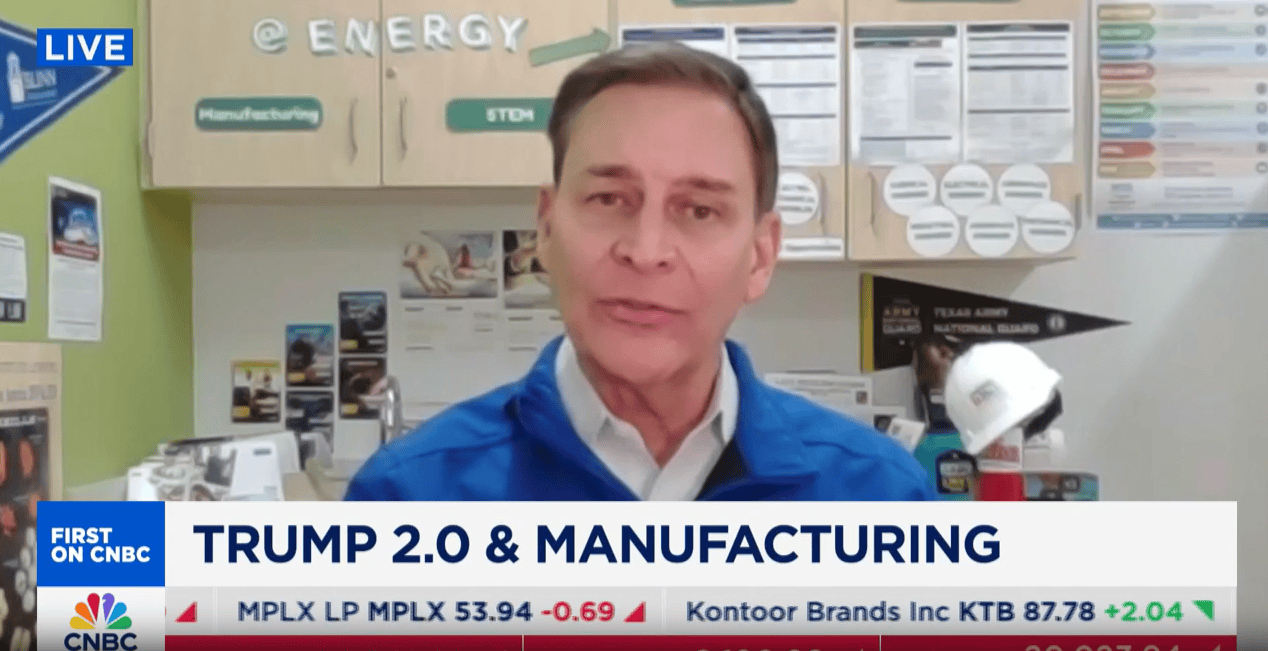
Manufacturers need an integrated, comprehensive strategy for expanding their sector, and a large part of that is preserving and bringing back tax reforms, NAM President and CEO Jay Timmons said on CNBC’s “The Exchange” Wednesday.
What’s going on: Timmons spoke to the news channel from a teacher workroom at the Energy Institute High School in Houston, Texas, a stop on the first leg of the NAM’s 2025 Competing to Win Tour. He told show host Kelly Evans that any plans to bolster manufacturing in the U.S. must “start with renewing those tax reforms from 2017.”
- “A smart strategy is going to involve reducing the cost of doing business for manufacturers here in the United States,” he said, praising Republican House leadership for being “able to move” forward a House budget bill “that’s going to set the framework for those tax rates to be set, hopefully, permanently in stone.”
- The 665-student Energy Institute High School, led by Principal Lori Lambropoulos, is the first high school in the U.S. dedicated to preparing students for careers in the energy industry.
What else is needed: Timmons echoed some of the major themes from the NAM State of Manufacturing Address, which he gave Tuesday in Ohio.
- “We also are looking at regulatory reform,” he told Evans. “We’re looking at expanding our energy dominance. We’re looking at workforce policy … and then, of course, we have to have a sensible trade policy as well.”
But back to taxes: Bringing back expired provisions from the 2017 Tax Cuts and Jobs Act, and making them and other, scheduled-to-expire provisions from the legislation permanent, is critical to manufacturing’s future success, Timmons continued.
- “Ninety percent of my 14,000 members are small and medium manufacturers. Most of them benefit from the pass-through deduction that expires this year. And I don’t think what you want to see is a huge tax increase that will cost 6 million jobs in the economy happen if we don’t renew those reforms,” he said, citing data from a recent NAM study on the effects of a congressional failure to act on tax reforms.
- “That’s why the Speaker’s actions in the last day or so have been so incredibly important to get this thing moving forward. President Trump actually endorsed that bill—the ‘one big, beautiful bill,’ as he calls it—and that will help make America great again for manufacturing.”
Energy dominance: Also critical to the success of manufacturing and the U.S. economy as a whole: the right energy policies, Timmons said. Promising to “unleash the energy sector,” President Trump lifted the previous administration’s ban on liquefied natural gas exports on his first day in office.
- Yesterday, the NAM got to see first-hand some of the effects of that kept promise, when the team visited Freeport LNG’s liquefaction facilities near Houston.
- More than 9,000 construction jobs were created during the construction of those facilities, which now directly employ about 400 people. Their operations have an estimated total positive economic impact on the U.S. economy of more than $5 billion a year.
- “Energy is … a critical national security component,” Timmons said on CNBC.
Emphasis point: The tour also stopped at Bray International, a global leader in flow control and automation solutions, supporting U.S. energy dominance, LNG exports and high-tech manufacturing.
- The visit helped underscore why policies that support manufacturing investment and provide certainty to manufacturers are essential to America’s economic future.
Up next: Today, the NAM is in Alabama, where this morning Manufacturing Institute President and Executive Director Carolyn Lee gave the Manufacturing Institute’s State of the U.S. Manufacturing Workforce Address at Drake State Community & Technical College in Huntsville. (The MI is the NAM’s 501(c)3 workforce development and education affiliate.) The theme: building the workforce of the future.
- This afternoon, the team will tour Toyota Motor Manufacturing Alabama in Huntsville, the manufacturing facilities of Bruderer Machinery in Huntsville and Milo’s Tea Company in Bessemer.
State of Manufacturing 2025: When Manufacturing Wins, America Wins
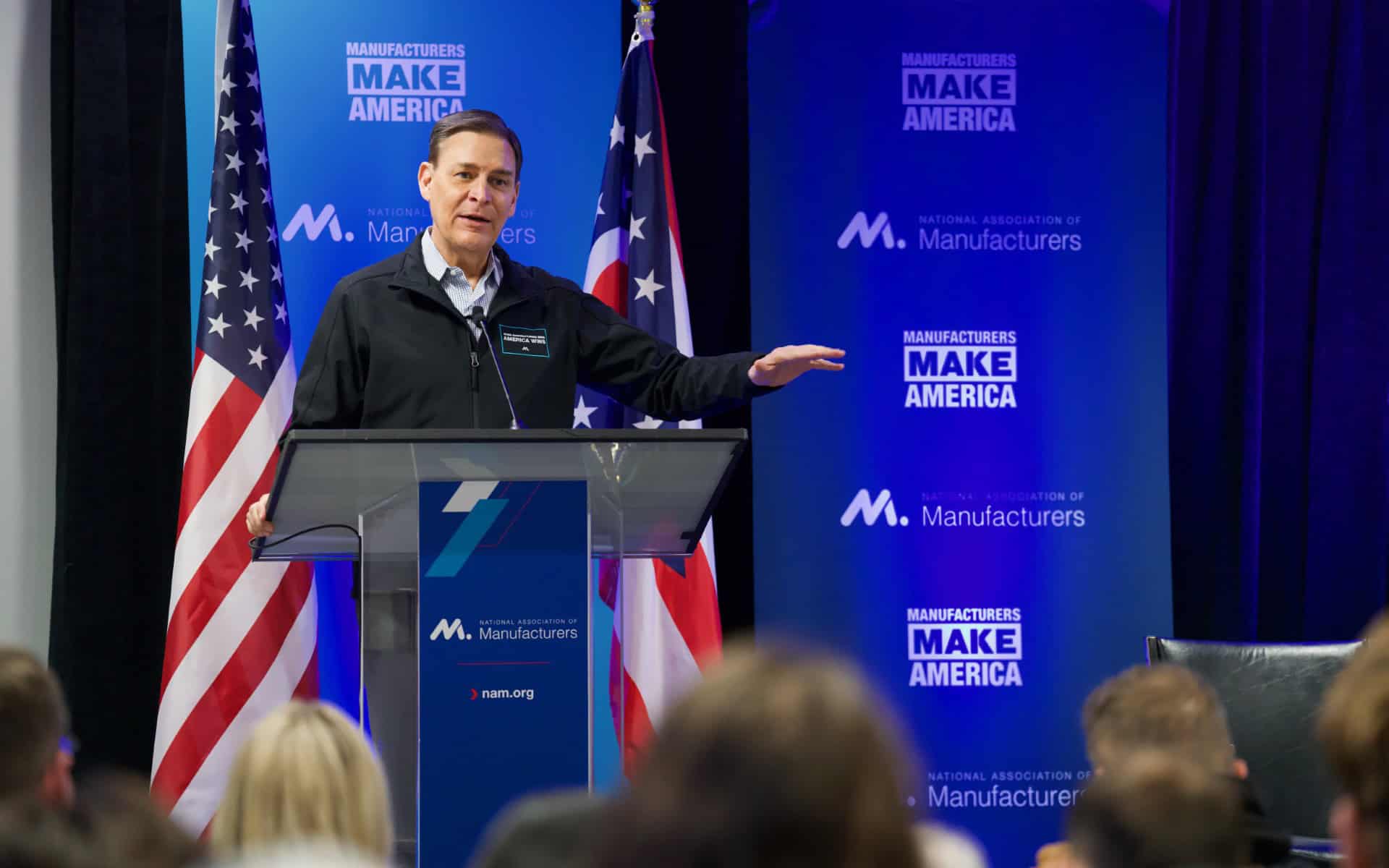
“Manufacturing in the U.S. has momentum”—and to keep it going, manufacturers will need to push, NAM President and CEO Jay Timmons said Tuesday in the NAM’s annual State of Manufacturing Address.
What’s going on: Speaking to an audience of manufacturers and congressional and state officials at Armstrong World Industries in Hilliard, Ohio, Timmons, who was joined by NAM Board Chair and Johnson & Johnson Executive Vice President and Chief Technical Operations & Risk Officer Kathy Wengel, emphasized the “defining moment” for the industry and said that for manufacturing, “what happens next really matters.”
- “Uncertainty is the enemy of investment,” he told the crowd. “Manufacturing is a capital-intensive industry. We make decisions months and years in advance. … That’s why we need certainty. We need a clear, actionable, multistep strategy from our government—one that says, ‘We want you to invest here, hire here and succeed here.’”
- Timmons’ annual speech kicked off the NAM’s 2025 Competing to Win Tour, starting with a whirlwind four-states-in-four-days tour of manufacturing facilities, schools, government offices and more.
- “In Ohio, manufacturers have thrived because our leaders have taken decisive actions to keep our industry competitive,” Ohio Manufacturers’ Association President Ryan Augsburger said at the kickoff event. But now, “manufacturers across Ohio and the nation are facing critical challenges, from tax uncertainty, project delays and workforce shortages to supply chain vulnerabilities and price pressures that threaten our ability to grow. … These issues cannot wait.”
What manufacturing needs: Certainty from the federal government should come in several forms, Timmons said, including the following:
- Preserving tax reform: The 2017 tax reforms were “rocket fuel” for manufacturing in America—but key provisions have expired and others are scheduled to sunset. Congress must bring them back and improve and extend the package. “Every day that Congress delays because of process and politics, manufacturers face rising uncertainty, delayed investments and fewer jobs,” said Timmons.
- Regulatory clarity and consistency: Manufacturers today spend a total of $350 billion just to comply with regulations. “Commonsense regulation is critical to American manufacturers to continue to innovate, to compete against foreign manufacturers and to improve the lives of American citizens,” Austin So, general counsel, head of government relations and chief sustainability officer for Armstrong World Industries, told the crowd.
- Permitting reform: President Trump’s lifting of the liquefied natural gas export permit ban was a start, but to reach our full potential as energy leader, we must require “federal agencies to make faster decisions and reduc[e] baseless litigation,” said Timmons.
- Energy dominance: “America should be the undisputed leader in energy production and innovation. But … we are seeing opportunities for energy dominance fade in the face of a permitting process that takes 80% longer than other major, developed nations,” Timmons said, adding that we must cut red tape, require federal agencies to make faster decisions and reduce meritless litigation.
- Workforce strategy: By 2033, manufacturing faces a shortfall of 1.9 million manufacturing employees, Timmons said. To fill those positions, the sector needs a “real workforce strategy,” one that includes apprenticeships, training programs and public–private partnerships.
- Commonsense trade policy: If President Trump continues to use tariffs, “we need a commonsense policy … that provides manufacturers with the certainty to invest” and “a clear runway to adjust,” according to Timmons.
State of manufacturing: “Manufacturing in the United States is moving forward,” Timmons said. “Like a press at full speed, like a production line firing on all cylinders, like the workers who show up before dawn and leave long after the job is done—manufacturing in the United States is driving us forward.” And Timmons added that now it’s time “to make America Great for Manufacturing Again.”
On the move: Following the speech, Timmons, Wengel and Augsburger joined state lawmakers, including state Sens. Kristina Roegner and Andrew Brenner, and local business leaders for a visit to the Ohio Statehouse for an event focused on the importance of tax reform for Ohio and its manufacturing sector.
- A recent NAM study found that, if key provisions of tax reform are allowed to expire, Ohio would risk losing 208,000 jobs and $18.9 billion in wages.
What’s at stake: Tax reform was transformational for Humtown Products, the Columbiana, Ohio–based family-owned sand cores and molds manufacturer, President and CEO Mark Lamoncha told the audience at the Ohio Statehouse tax event.
- “We have been at the forefront of 3D-printed manufacturing for years and have invested significantly in the machinery and equipment required, including the purchase of 3D printers—one of which can easily cost over $1 million,” he said.
- “Since the 2017 tax reform, Humtown has invested over $9 million in capital expenditures related to 3D printing and averages around $100,000 annually in R&D costs. Under the 2017 tax reform, we were able to deduct 100% of those costs, generating around $1.6 million in accelerated tax savings.”
- “That amount alone allowed us to purchase another 3D printer, fueling continued growth. That’s what tax certainty allowed us to do. But right now, that certainty is slipping away. As these provisions begin to expire, our tax burden is increasing.”
Creators Wanted: The group also fit in a stop at Columbus State Community College, which serves approximately 41,000 students, to visit with students in the semiconductor and mechanical drive classes.
The last word: The NAM recently “stood shoulder-to-shoulder with congressional leaders—delivering a clear, urgent message on tax reform” and is “driving the agenda on regulatory certainty, on energy dominance, on permitting reform, health care and workforce development,” Wengel told the audience. “The NAM is not waiting for Washington to act; we are making sure Washington acts for you, for manufacturers.”
- Added NAM Executive Vice President Erin Streeter: “The NAM is on [these issues], and we’re going to keep fighting, as we do every day with the right leaders, the right strategies and the right vision for the future.”
Manufacturers Need a Jolt of Certainty
As New Tariffs Announced, NAM Calls on Congress to Act Now on 2017 Tax Reform Renewal and Permitting Reform
Washington, D.C. – National Association of Manufacturers President and CEO Jay Timmons released the following statement:
“Manufacturers in the United States are facing intense global competition, economic headwinds and unfair trade practices from adversarial nations. With critical tax reforms having lapsed and others still set to expire as well as inaction on comprehensive permitting reform, our industry is struggling to invest, innovate and compete.
“Manufacturing is a capital-intensive industry—and we must plan months and often years in advance to grow and compete. We cannot afford to wait on action, especially with additional cost pressures from the renewal and extension of tariffs. Manufacturers are calling on Congress to act now to renew the 2017 Tax Cuts and Jobs Act—failure to do so will put 6 million jobs at risk and make it even harder for manufacturers to drive growth and strengthen supply chains. We cannot risk giving our competitors an edge while jeopardizing American jobs and economic strength.”
-NAM-
The National Association of Manufacturers is the largest manufacturing association in the United States, representing small and large manufacturers in every industrial sector and in all 50 states. Manufacturing employs nearly 13 million men and women, contributes $2.93 trillion to the U.S. economy annually and accounts for 53% of private-sector research and development. The NAM is the powerful voice of the manufacturing community and the leading advocate for a policy agenda that helps manufacturers compete in the global economy and create jobs across the United States. For more information about the NAM or to follow us on Twitter and Facebook, please visit www.nam.org
SMM Chair: Extend Pro-Growth Tax Policy, Prioritize Permitting and Regulatory Reform

To lift much of the burden on manufacturers in the U.S., Congress must reinstate pro-growth tax measures, enact commonsense regulatory reforms and undertake comprehensive permitting reform. That was the main message of Click Bond CEO and NAM Small and Medium Manufacturers Group Chair Karl Hutter to legislators yesterday on Capitol Hill.
What’s going on: “American businesses now shoulder a staggering $3 trillion annually in regulatory costs—disproportionately impacting manufacturers,” Hutter told the House Committee on Small Business at Wednesday’s hearing.
- “Unfortunately, small companies get hit twice—with unworkable regulations that apply to them [and again with] compliance and reporting requirements that larger firms are forced to pass down. Fortunately, Congress and the Trump administration have the opportunity to reverse course.”
Rocket fuel for manufacturing: The 2017 Tax Cuts and Jobs Act “was rocket fuel for Click Bond,” said Hutter—whose Carson City, Nevada–based family business makes adhesive-bonded fasteners used by the U.S. military, commercial aviation industry and NASA.
- “The new 21% corporate tax rate allowed us to raise wages for production employees, invest in capital equipment, strengthen our employee tuition support program and accelerate the timeline for constructing a new facility. The new 20% pass-through deduction likewise empowered our suppliers and partners to reinvest in their businesses, readying them to support our growth.”
Changes for the worse: But growth was halted in 2022 and 2023, when provisions from the TCJA began to expire. Worse still: More pro-growth tax measures are due to expire at the end of this year—unless Congress intervenes.
- “It is now more expensive for Click Bond to conduct R&D, the lifeblood of both our product and process innovation,” according to Hutter. “It’s more expensive for us to purchase capital equipment, the tools that will unleash the productivity of our team. And it’s more expensive for us to finance job-creating investments such as that state-of-the-art, sustainable manufacturing facility.”
Ill effects: According to a recent study released by the NAM, nearly 6 million American jobs and more than $1 trillion of U.S. GDP will be at risk if Congress fails to act by the end of this year to preserve TCJA’s pro-manufacturing provisions.
What should be done: Manufacturers everywhere are struggling under the weight of both these provisions’ expiration and needless, out-of-date government requirements, Hutter went on. To fix these problems, he said, Congress should:
- Unwind “outdated chemicals reporting requirements that force us to look backward in time and deep into our supply chain”;
- Stop unnecessary permitting roadblocks by the Environmental Protection Agency at the state and local levels;
- Roll back expensive energy and labor mandates;
- Undertake “comprehensive permitting reform”; and
- Make permanent the pro-manufacturing tax provisions scheduled to sunset at the end of 2025 and bring back already expired provisions that boosted the sector and the U.S. economy as a whole.
The final say: “Congress has a critical opportunity to right-size the regulatory landscape, put an end to permitting delays and protect manufacturers from devastating tax increases,” Hutter concluded. “I encourage you to seize [it] … because when manufacturing wins, America wins.”
Timmons, Chairman Smith: Preserve Tax Reform Now
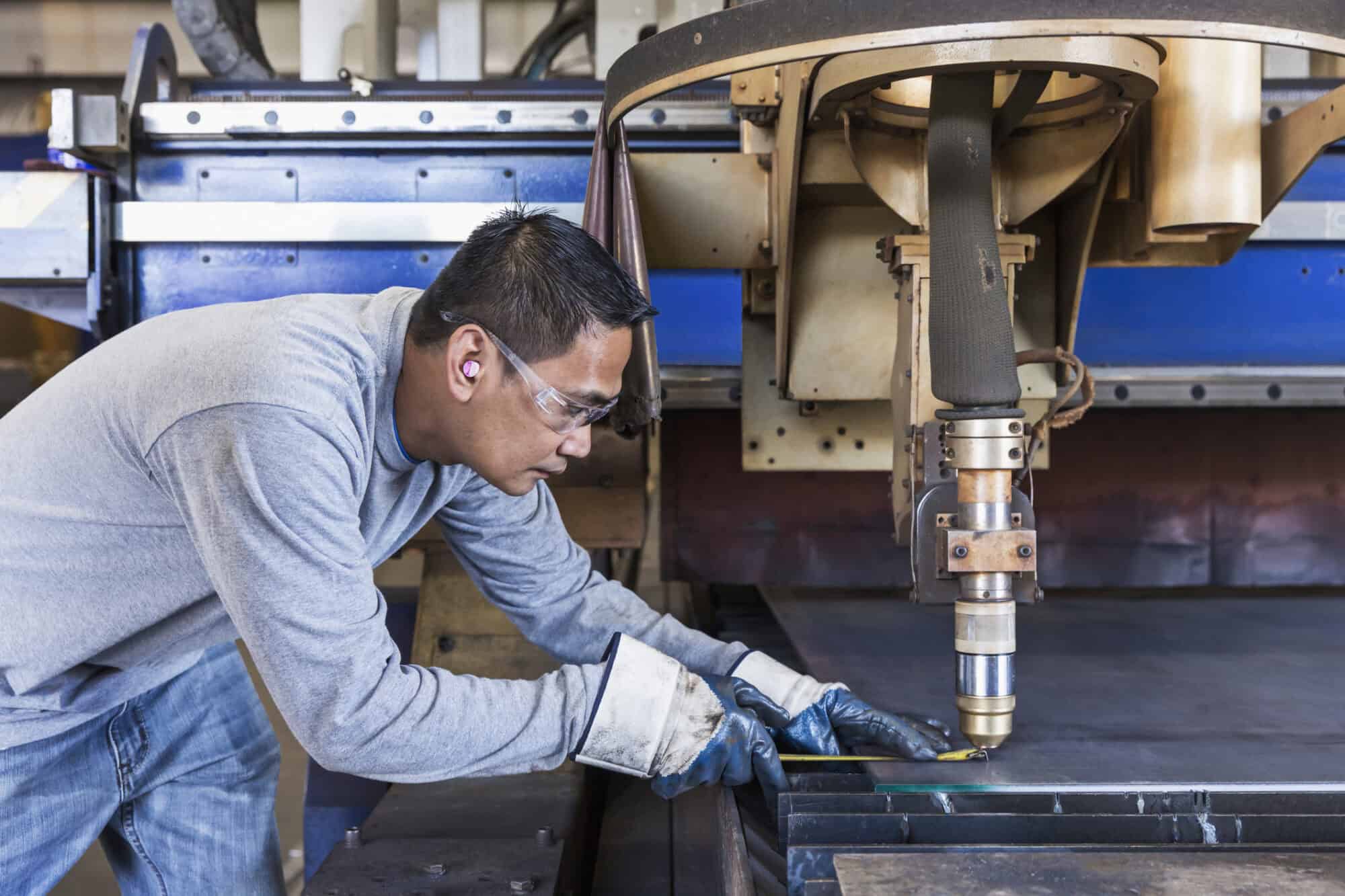
For a stronger, more competitive America, Congress must make permanent the pro-growth tax provisions from President Trump’s 2017 Tax Cuts and Jobs Act, NAM President and CEO Jay Timmons and House Ways and Means Committee Chairman Jason Smith (R-MO) wrote in a recent op-ed for the Washington Examiner.
What’s going on: “The choice is clear. Congress must deliver the results the American people voted for on Election Day by extending and expanding Trump’s pro-growth tax policies, which have worked so well.”
- The reforms allowed manufacturers “to hire, expand and invest in their communities” at historic rates, with a particularly positive effect on small and medium-sized businesses.
- Georgia-based Winton Machine Company, which produces machinery used in tubular parts and coaxial cable fabrication, would not have been able to expand its workforce, raise employee pay or purchase critical technology had it not been for the TCJA, as Winton CEO and Co-Owner and NAM board member Lisa Winton told Congress in 2023.
- Austin Ramirez, president and CEO of hydraulic and electromechanical control systems maker Husco in Wisconsin and NAM Executive Committee member, told legislators that tax reform allowed his family-owned company “to create jobs, expand research and development, compete globally and invest in its future, including the most significant renovation of his business in 70 years,” Timmons and Chairman Smith wrote.
What’s at stake: “Key provisions of the 2017 Trump tax reforms have already expired, and many more are set to lapse later this year,” Timmons and Chairman Smith continued.
- “Without swift action, manufacturers will miss out on tax incentives for research and development and equipment purchases, while small businesses and family-owned manufacturers will see their tax rate double to as high as 43.4%—all at a time when global competition is intensifying.”
According to a recent NAM study cited in the op-ed, if Congress fails to preserve tax reform by the end of this year:
- Nearly 6 million U.S. jobs—more than 1 million of them in manufacturing—will be lost; and
- America will lose some $1.1 trillion in GDP and $540 billion in wages.
What must be done: Congress must act now to restore the pro-manufacturing tax provisions that have already sunset and make permanent those that are scheduled to expire, Timmons and Chairman Smith concluded.
- “With Trump leading the charge, it is time for Congress to deliver, protect these reforms and set American workers up for success in 2025 and beyond. Together, we can ensure the next chapter in America’s story is one of growth, opportunity and strength.”
Small Manufacturer to Congress: Let Manufacturing Thrive
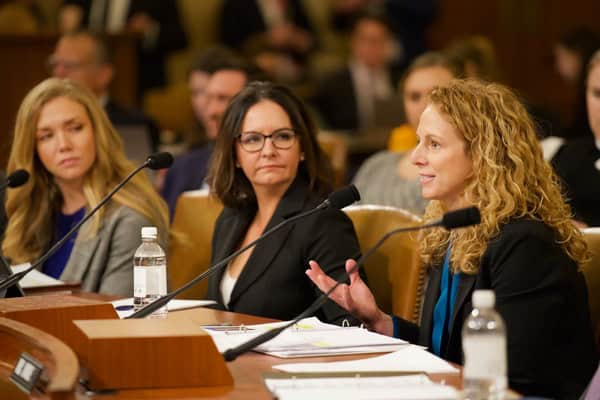
Preserving the pro-manufacturing policies of the Tax Cuts and Jobs Act will “ensure that manufacturing remains the driving force of the American economy,” small manufacturer Courtney Silver told Congress this week.
What’s going on: Silver—president and owner of third-generation, family-owned precision machining business Ketchie and immediate past chair of the NAM’s Small and Medium Manufacturers Group—testified Tuesday at a House Ways and Means Committee hearing on the necessity of preserving soon-to-expire tax reforms and reinstating provisions that have expired already.
- “Critical pro-growth provisions from tax reform have expired already, and more harmful changes are on the way at the end of this year,” she said. “This means that every member of this committee has the opportunity to take real action that supports manufacturing in America.”
A critical moment: The stakes now are extremely high for manufacturing and the U.S. economy as a whole, she added, citing findings from an NAM study out this week showing that in the absence of congressional action to preserve pro-manufacturing tax policies:
- Nearly 6 million U.S. jobs (and more than 1 million manufacturing jobs) are at risk;
- American workers will lose more than $540 billion in wages; and
- U.S. GDP would fall by more than $1 trillion.
A recipe for success: The passage of tax reform led to a period of record business for Ketchie, which allowed the company to expand and reward its team members.
- “Over 2018 and 2019, we were able to invest more than $1 million into capital equipment and create new jobs within Ketchie,” Silver said. “We upgraded our security and our HVAC systems and invested in new technology on our shop floor. And most importantly, we provided raises and bonuses to all of our employees.”
- “Business boomed throughout our supply chain, and demand for our parts soared. Our typically organized shop floor was covered in pallets of materials to keep up with our customers’ orders.”
… and for stagnation: But that growth was stopped in its tracks in 2022, when measures from the TCJA began to expire. And more expirations are on the way.
- “The loss of the pass-through deduction, increased individual taxes and changes to the estate tax will hurt my ability to grow and create jobs,” Silver said.
Ripple effect: What’s more, manufacturers rely on each other—so when one takes a hit, all their supply chain partners take it, too, Silver said.
- She told the committee that the software vendor Ketchie uses was “dramatically affected” by the 2022 expiration of first-year research-and-development expensing. “They have less ability to create new jobs, to innovate the product that I use every day to run my business,” Silver told the committee. “There’s a ripple effect.”
Complex work requires certainty: The manufacturing sector isn’t “me buying equipment, pressing a button and a widget comes out,” Silver continued. It is a complicated industry on which millions rely every day—and one whose players need consistent tax policies.
- “To take raw material and to transform it into a useful object that we all benefit from is extremely tough,” Silver went on.
The bottom line: “We need pro-growth tax policies that are permanent, that are consistent, that are predictable to help us be able to grow because our manufacturing supply chain in our country needs us,” Silver said.
A busy week: Silver also spoke at the NAM’s Tuesday Capitol Hill press conference announcing the release of the tax study.
NAM, GOP: Manufacturers and Families Need Pro-Growth Tax Measures
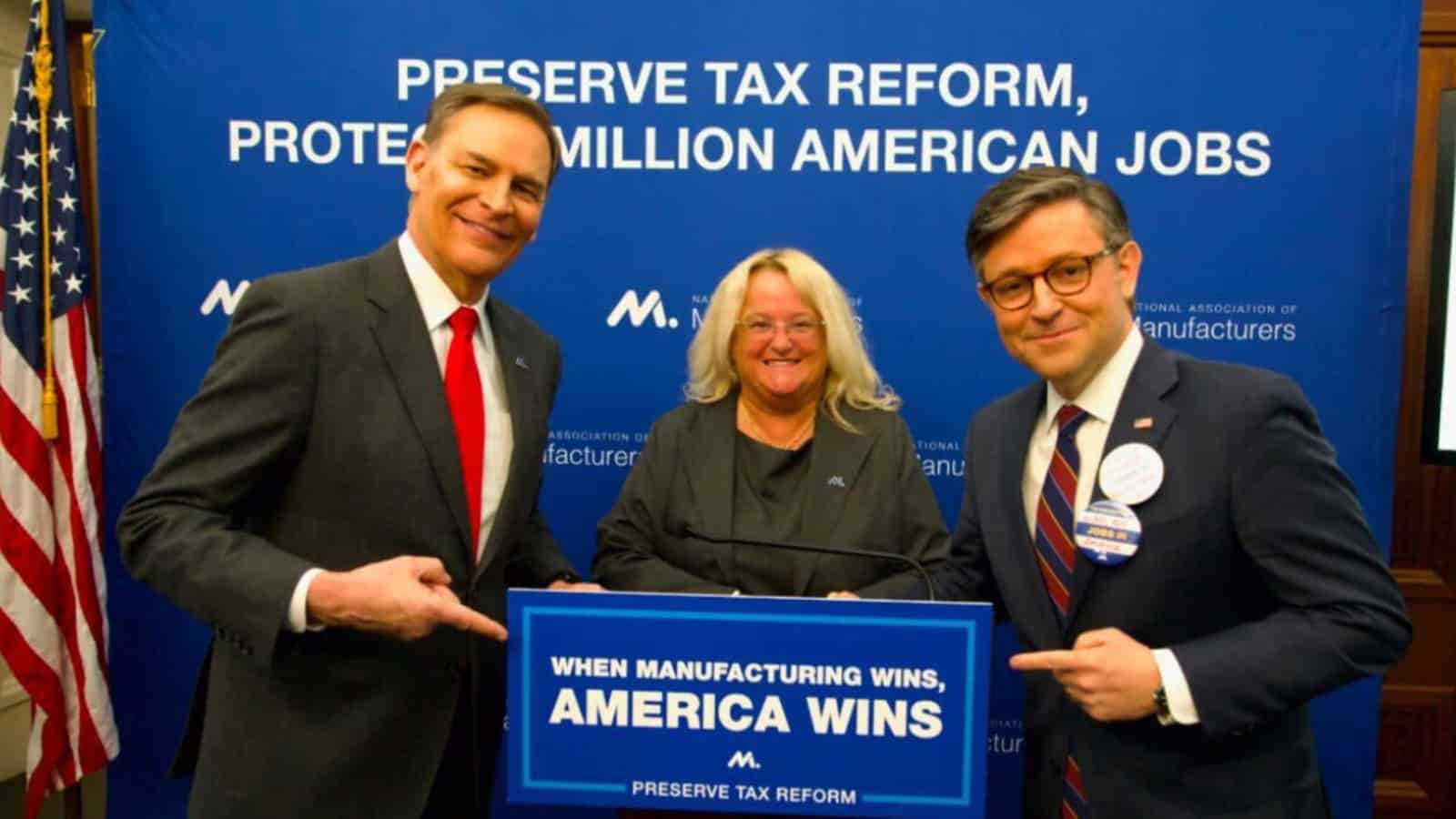
More than just the manufacturing sector depends on the preservation of key provisions from the 2017 Tax Cuts and Jobs Act. In fact, the health of the entire U.S. economy relies on it.
What’s going on: The NAM, members of congressional leadership, the chairs of the House Ways and Means and Senate Finance Committees and manufacturing leaders came together at a Capitol Hill press conference yesterday to announce the release of a new NAM study, which found that the American economy will face significant headwinds if Congress does not preserve pro-manufacturing tax policies. Specifically:
- Almost 6 million jobs will be put at risk;
- Approximately $540 billion in employee wages will be lost; and
- U.S. GDP will be reduced by $1.1 trillion.
A record of success: “We’re here today because we know what happens when policies empower manufacturers and their workers, and we know what happens when they don’t,” said NAM President and CEO Jay Timmons, who was joined at the event by Johnson & Johnson Executive Vice President and Chief Technical Operations & Risk Officer and NAM Board Chair Kathy Wengel, as well as leadership from Miles Fiberglass & Composites, Ketchie, Armstrong Industries, Smurfit Westrock, RCO Engineering and RCO Aerospace and Winton Machine Company. “When Congress passed and President Trump signed the Tax Cuts and Jobs Act law in 2017, it really wasn’t a victory just for manufacturers; it was a victory for the entire country.”
- Timmons mentioned the record job, wage and investment growth that followed tax reform’s passage, as well as the economic security achieved by families across the country.
Too much at stake: “Now, as we know, the progress we’ve made is at stake,” Timmons continued. “And that’s why today we’re launching a landmark new study by the NAM, together with EY, and rolling out a major ad campaign that quantifies what’s at stake for the American economy … if pro-manufacturing provisions … are allowed to expire.”
People first: Courtney Silver, president and owner of North Carolina–based precision machining company Ketchie and immediate past chair of the NAM’s Small and Medium Manufacturers Group, knows firsthand the devastation that can be wrought on a family-owned business when pro-growth tax provisions start expiring.
- “When the Tax Cuts and Jobs Act delivered for us, we invested in equipment, we invested in technology and most importantly, we invested in our people,” she told those at the press conference, adding that because of the reforms, Ketchie was able to give its entire workforce pay raises and quarterly bonuses in the years following tax reform’s enactment.
- “When [pro-growth policies] started expiring, it impacted Ketchie in a big way,” Silver went on. “These losses made it harder for us to do the work that matters to us. I have an empty spot on my shop floor held for a significant investment that the expiration of full expensing has made too costly to purchase.”
“Congress cannot delay”: “Failing to extend the pro-manufacturing tax policies Congress and President Trump provided in 2017 will destroy America’s competitive edge,” House Ways and Means Committee Chairman Jason Smith (R-MO) said. “This study underscores the need to extend the Trump tax cuts this year as quickly as possible. Congress cannot delay.”
Competitive edge: Tax reform gave the U.S. back its competitive edge, and to ensure we keep it, we need to reinstate expired provisions and prevent the expiration of measures due to end this year, House Majority Leader Steve Scalise (R-LA) said.
- Before tax reform, “we were getting our clocks cleaned by foreign countries because we had a 35% corporate [tax] rate, and the world average was 23%,” he said. “When you [asked], ‘How do we make America competitive again?’ everybody that works, everybody that creates jobs in America, said, ‘How about we get competitive in the tax code so we don’t lose jobs to foreign countries?’”
- Scalise added that congressional Republicans have a “very aggressive” timeline for restoring these tax provisions.
Strong economy, strong country: Senate Finance Committee Chairman Mike Crapo (R-ID), whose remarks closed out the press conference, said “piling taxes upon taxes upon taxes” is no way to build a resilient, successful economy.
- “The way to make us strong is to build a strong, powerful economy, which we get with sensible, pro-growth tax reforms,” he concluded.
